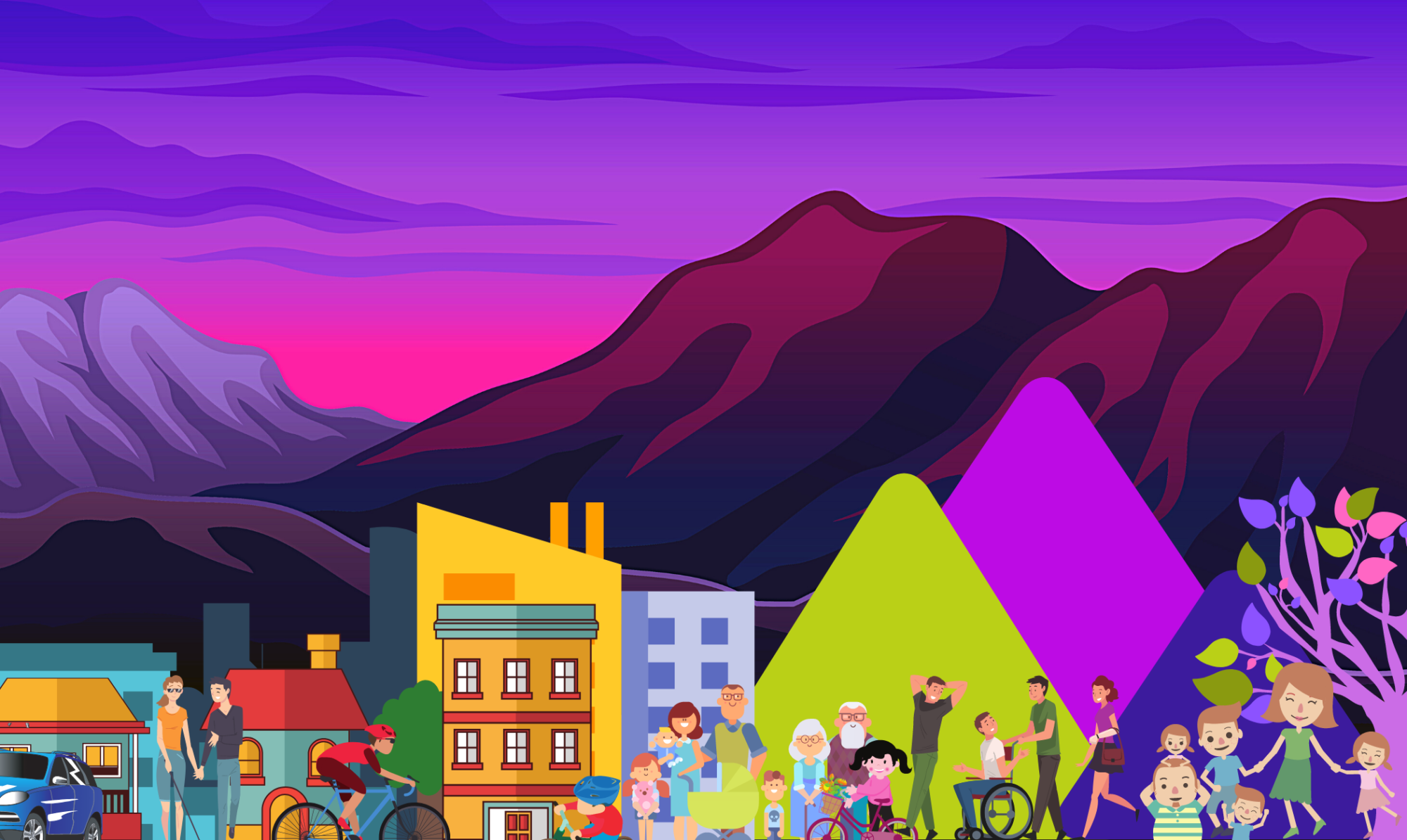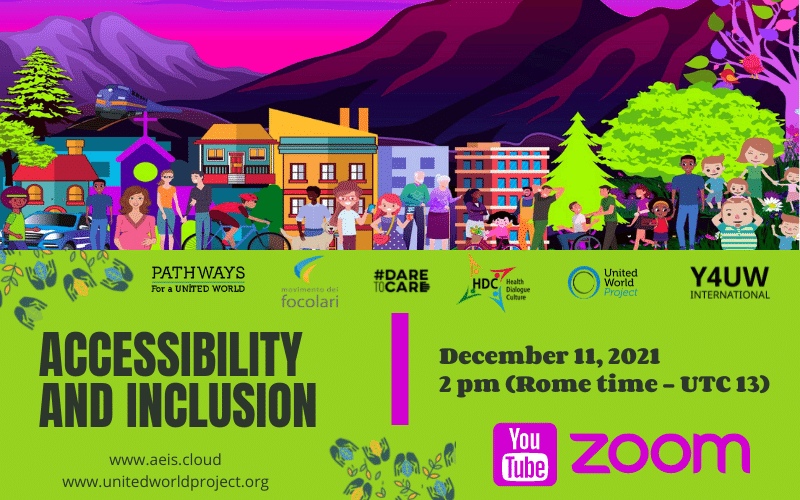December 11, 2021 2 pm (Rome time – UTC 13) | Webinar
Watch again the Webinar on YouTube
Webinar report
by Herman Wouters
This webinar focused on persons with intellectual and relational disabilities and barriers that hinder their inclusion. It included four presentations, followed by a discussion.
The first presentation was given by Mr. Mario Sperandini, from Macerata, Italy, Board Member of ANFFAS (National Association of Families and People with intellectual disabilities and neuro-developmental disorders). He said that the association ANFFAS was founded in 1958 to safeguard the rights of people with disabilities so that they were not excluded anymore or segregated in home cloister. Today it has nearly 200 local associations all over Italy. Mario started his commitment within ANFFAS in his hometown Macerata in 1973 after the birth of his daughter Michela who had an intellectual disability. Later, he became Board member of the local association and in 1989 he was elected in the national Board. The priorities of ANFFAS are summarized in the UN document on the rights of persons with disabilities, that every administration or citizenship should consider. It’s about hospitality, cultural and social inclusion. If this are the rights it has to be done, even without funds available. Also the slogan “Nothing about us without us” represents this “wanting to be”. Disability can be of great value in the social body as people recognize this value.
The second presentation was given by Mr. Herman Wouters, from Belgium, Master in Special Education. He said that most of the people with profound and severe intellectual disability don’t speak. To enter in relationship with them it’s very important to be aware of the non-verbal communication. In a first stage a very good observation of the behaviour of the person (gestures, movements, the start of new actions, etc.) is essential. Later on you can interpret the behaviour you just have observed: what is going at that moment inside the person (sensations, feelings, thoughts, motivation, etc.). By establishing a mutual non-verbal communication, you create reciprocity and a feeling of companionship, which means “social inclusion”. Then follows an example of this kind of communication and reciprocity during a session of music therapy with a young adult called Timmy (for a better quality of this presentation and Timmy’s video, see https://youtu.be/IkIqNCB9jUk).
The third presentation was by Jacopo Corona and Frolla, from Osimo, Italy (https://frollalab.it). The project Frolla, a biscuit factory and a bar run by people with intellectual or physical disability, started as a production workshop in 2018 by two friends, Jacopo Corona, a young pastry chef and Gianluca Di Lorenzo, a social worker. The aim is to create work for people with a disability. The central idea of the project is to sell high-quality cookies. Frolla doesn’t want people to buy their cookies by pity or by a sort of duty of social responsibility towards people with an handicap. For a true inclusion the concept of sharing lives is a fundamental value. Their cooperative community is rather a family. Also “openness” is an important concept: by first welcoming the people, they can quietly express themselves.
The last presentation was by Bénédicte Draillard, from Lyon, France, municipal vice-responsible for services for the elderly. Bénédicte Draillard was showing an exhibition for the Women’s Day at the gate of the town hall garden to a group of elderly. One of the participants – a women with her husband who had Alzheimer disease – proposed her to place a ping pong table in the park because she had read that his would be helpful for people with Alzheimer from a psycho motor and a cognitive point of view. Together with the French Alzheimer association, Ms Draillard put forward a request to the central town hall of Lyon. Recently she got the message that ping pong tables will be placed in every park of Lyon.
A discussion followed, raising the following main points:
Herman Wouters (Belgium): also in Belgium many projects for people with disabilities started by parents with handicapped children. They are an important mean in doing this kind of things for the society.
Renzo Andrich (Italy): there is a big prejudice that you can’t communicate with people with a profound intellectual disability. In the last years we have those sensory rooms for the activity called “Snoezelen” and instruments were you just have to press a button to have a reaction. Could this bring an important progress in the communication and the relationship with people?
Herman Wouters (Belgium): indeed sometimes people say that you can’t communicate with a person with a profound intellectual disability, but that is not true. We only have to adapt our way of interaction. Everyone knows for instance that with babies from their first weeks there is a lot of communication possible without verbal talk. Probably you must experience this first by yourself in a contact with the profound intellectual disabled person to see that this is also easily possible with them. A good practice is sharing an activity, change something in the action, and then wait for a reaction. Then you continue the interaction as you see in the video of the music therapy with Timmy.
Loli Funk (Manila Philippines): I saw once a film about a person with Alzheimer where the question of you can communicate with them also rises. Sometimes that person starts to cry and the nurse was aware that something happened inside of that person: maybe a memory that has caused sad feelings from the past.
Cyntia Kyi (Myanmar): reciprocal communication in the video with Timmy, a person with a profound intellectual disability, in the session of the music therapy enlightened me how to observer and listen to body language.
Ghislaine Dias (India): if we treat differently abled people as “heroes” instead of “zeros” the whole community will change their thinking about them.
Loli Funk (Manila Philippines): the question is what you can do in your own area. An good example is the creation of ping pong tables in Lyon. Or to be more open and take the risk to start working with persons with a disability, when you listen to the experience of Frolla where the quality of the product is important.
Renzo Andrich (Italy): recently Frolla received the European award “European citizen of the year” from the European Parliament in Strasbourg and consequently they got a lot of orders and a lot of work. For the moment they have 18 employees. The main idea of the ping pong tables in the experience of Bénédicte Draillard in Lyon was the creation of place where people can meet and start a relationship. This is the first step to integration: when you are beside a person you stop being afraid of him or her. Doing something together breaks the mental barriers.
Loli Funk (Manila Philippines): a simple act between human beings also creates ripples. Being rewarded means that more people hear about an initiative and the impact becomes bigger. So, we create a mentality. When you see that there is a lot of love going around, you start to believe in humanity again. We need a lot of these things. The challenge for every one of us to bring ahead this way of thinking by talking about it, by making our environments more accessible to more people. A more inclusive society would be a more beautiful world for everyone.
Download the flyer >> PDF DOCX
Download the flyer of the entire Webinar series >> PDF DOCX
Watch the previous webinars on Youtube:
– Webinar 9/5/2021 (introducing the project)
– Webinar 10/9/2021 (New perspectives from experiencing limits)
– Webinar 9/10/2021 (Accessibility and built environment)
– Webinar 13/11/2021 (Accessibility to Information and Communication)

